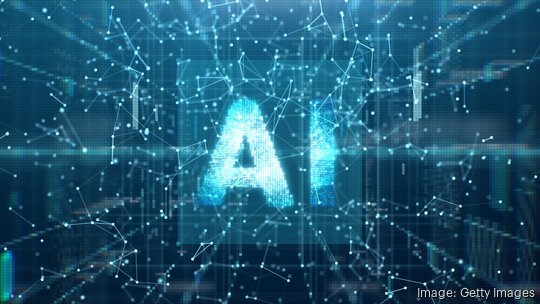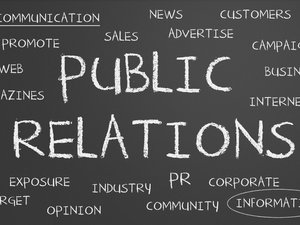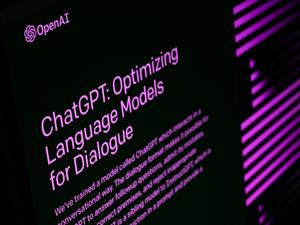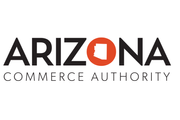
With President Biden issuing an executive order to try to set parameters for the use of artificial intelligence, Valley experts are weighing in on how it could impact local businesses.
According to the White House website, the primary purpose of the order — known as the Executive Order on Safe, Secure and Trustworthy Artificial Intelligence — is to establish new standards for AI safety and security, protect Americans’ privacy, advance equity and civil rights, stand up for consumers and workers, promote innovation and competition and advance American leadership around the world.
The order, issued on Oct. 30, is a “baby step” on the part of the federal government, said Steven Zylstra, the president and CEO of the Arizona Technology Council and SciTech Institute.
"It's a first step to provide some rules and some guidance around how we all should use AI," Zylstra said.
With more companies harnessing the power of AI to augment human work, there has been rampant concern about how workers will be affected as the AI race amps up.
To mitigate threats of workplace surveillance, bias, and job displacement due to AI, a directive within the order that's labeled "Supporting Workers" suggests the development of best practices that offer a guideline to maximize the benefits of artificial intelligence for employees such as preventing employers from undercompensating workers, unfairly evaluating job applications or impinging on workers’ ability to organize.
Workers will face job displacement
But even with these stipulations in place, job displacement is inevitable, said Vincent Serpico, CEO of Phoenix-based software development company Founders Workshop and co-founder of Decision Tree AI, which helps businesses leverage their data and processes with AI.
“Every single time we have technological breakthroughs in the history of humankind, there's always been job displacement; the greater the technology, the more job displacement there is,” Serpicao said. “I firmly believe that AI will create entire new industries that we'd never even conceived of before, and there will be a massive amount of new jobs created that are just way, way more than the jobs that are displaced.”
Zylstra described generative AI as transformative and likened it to other innovations such as the internet and the smartphone.
“AI, at the end of the day, is still just a tool like all those other things I mentioned: the internet, the personal computer, the calculator. All those things that have transformed the world … the tools are designed to improve society in some way,” Zylstra said.
Eliminating labor-intensive and undesirable jobs is one component of that transformation, he added.
In addition to establishing best practices, the order also calls for the production of reports detailing AI’s potential labor-market impacts and providing solutions for supporting the displaced workers.
However, Serpico said he does not expect to see action due to how quickly AI developments will occur.
“I don't have much faith in reports being written, our government reading those reports, and then taking action on it fast enough for how fast job displacement is going to happen, “ Serpico said. ”AI is going to happen so much faster than anyone's realizing. By the time they start reading these reports, a lot of it's already going to happen.”
Zylstra expressed a similar sentiment and emphasized that, although the executive order is not a law passed by Congress, it provides a guide for companies to follow.
Protecting intellectual property
With the prospect of AI-generated content infringing on intellectual property rights, having a way to measure authenticity could be beneficial. Attorney Jordan Rose, president and founder of Rose Law Group, told the Business Journal in a recent interview that with the ease of appropriating someone else’s work using AI, the courts would be saddled with settling infringement cases.
Rose also said she foresees cases involving AI infringement being “one of the busiest fields of legal practice over the next decade.”
Another directive called "New Standards for AI Safety and Security" — which is defined as protecting Americans from the potential risks of AI systems such as detecting AI-generated content and authenticating official content — is a provision that could address this issue. Zylstra is in favor of the directive because it recommends using watermarks to label AI-generated content.
“The whole watermarking concept of being able to know what's authentic, and what was generated by AI, I think, is probably a good idea,” Zylstra said. ”AI can do incredible good. But it also can do things that bad actors will try and utilize it for.”
Promoting innovation
Another directive in the executive order, "Promoting Innovation and Competition," said that more AI startups raised first-time capital in the United States last year than several other countries combined.
To ensure that the country continues to lead the way in this area, the order encourages providing small developers and entrepreneurs access to the technical assistance and resources they need as well as helping smaller businesses commercialize their AI breakthroughs.
Serpico said he favors this provision particularly the catalyzing of AI research throughout the country using the National AI Research Resource, a tool providing AI researchers and students access to AI resources and data.
“We've got a lot of scrappy, intelligent people in the United States that don't have major funding but can really, really push the needle. And that's what we've seen through entrepreneurship,” Serpico said. “It's been about, you know, not the incumbent, but the underdog who has always created the next best product or service, and I'm a huge, huge advocate of providing funding and resources to entrepreneurs and startups getting into AI.”
The ability of small businesses and entrepreneurs to be agile and not “encumbered by the bureaucracies of large corporations” is also what Zylstra said will make it easier for them to be innovative when it comes to AI.
“So I think, you know, regulating the industry that's producing AI, we have to be careful there, because we don't want to stifle innovation,” Zylstra said. “Our adversaries are all working hard on AI as well. And we must keep up with them.”











